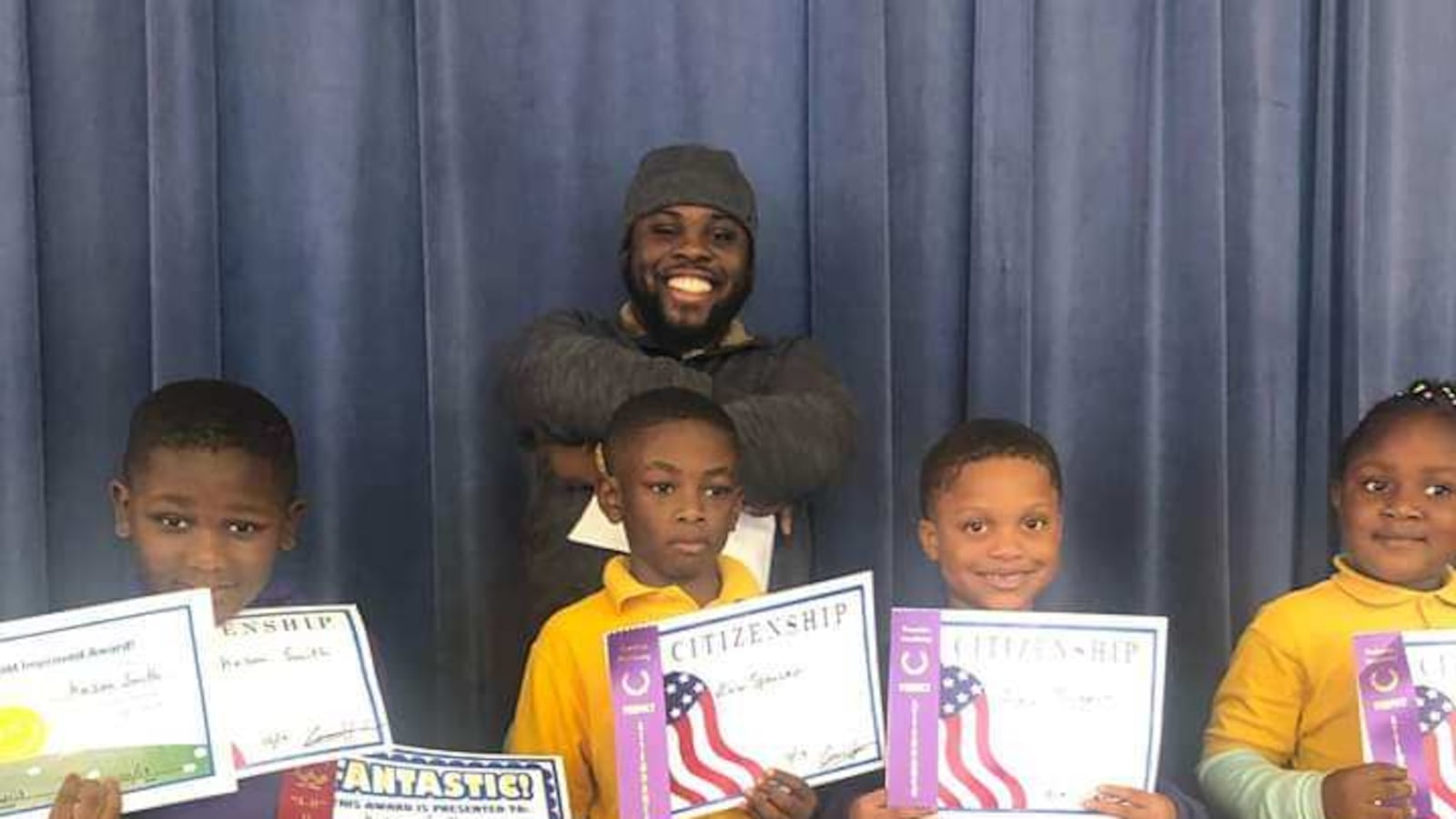C.J. Harris said that one of his greatest challenges as a teacher in Memphis is keeping students’ “trials and tribulations” far away from his classroom.
“I try to make my class an oasis from the storms that scholars go through,” said the first-grade English teacher at Promise Academy Spring Hill Elementary School. “I try to keep the learning process as untouched from those things as possible.”
But Harris also acknowledges that sometimes he can’t keep his students detached from the family struggles they may face. He said he tries to help his students better understand their emotions because it’s difficult to teach them how to read if they can’t first process what’s on their minds.
He added that it’s important to be an everyday part of his students’ lives, even after they leave his classroom. Harris reflected on one student in particular that he is still close to.
“I’ve seen him cry during the turbulent times in his life and explode with laughter as I stood up on a table during a particularly silly lesson,” Harris said. “I earned his trust and respect by standing resolute and being a consistent part of his growth.”
We spoke with Harris about how he gets to know his students, what his classroom oasis looks like, and why getting to know a student’s family is important.
He was one of five Memphis educators selected by nonprofit New Memphis for its second round of winners of the Educators of Excellence Awards, which honors teachers in some of Memphis’ highest-needs schools with a prize of $1,500.
This interview has been lightly edited for clarity and length.
Who inspired your teaching style?
I had two amazing teachers when I moved here from Germany. They were instrumental in pushing me toward becoming the educator I am today because of the firm but fair demeanor they both possessed. They took the time to develop me as a whole student, not just academically. Many life skills I instill in my scholars today are from the blueprint they gave me.
What student or accomplishment are you most proud of?

When I think specifically on the scholars that I’ve gotten to know inside and outside of the classroom, a relationship I am particularly proud of is one that I’ve cultivated with a former student.
I still remember the day he walked into my classroom bright-eyed and nervous as he tentatively found his seat. Little did he know that that was my first day as a lead teacher and his apprehensions were matched with my own. Since that day, I’ve celebrated two birthdays, consoled him in losses, and seen him raise academic and athletic trophies. None of those things would have been possible without investing time, affection, and plenty of what every great teacher needs: patience. I’ve seen him cry during the turbulent times in his life and explode with laughter as I stood up on a table during a particularly silly lesson. I earned his trust and respect by standing resolute and being a consistent part of his growth. I try to represent a tangible goal for him to aspire to.
What do you enjoy most about teaching?
I really enjoy teaching in one-on-one settings like guided reading, tutoring, or even coaching other teachers. It is a time for the student to build their confidence through engaging and exciting “at-bats,” or when I ask them specific questions. I always outline the positives and then build on “next time let’s try.” I feel like that’s a very effective way to communicate in general.
What object would you be helpless without during the school day?
Markers, for sure, but I have a hat that has been with me for years that I prefer to keep with me as well.
What’s something happening in the community that affects what goes on inside your class?
I try to make my class an oasis from the storms that scholars go through. Our community is one with many trials and tribulations that do not discriminate because of age, and I try to keep the learning process as untouched from those things as possible.
The definition of an oasis is a fertile spot in an otherwise dry and barren land. Though physically my students do not live in the desert – although food deserts are prevalent and plentiful in the urban landscapes of Memphis – I’m speaking mostly in an emotional or academic sense. Students aren’t being taught to properly internalize and adapt to new emotions, so they are left on their own to digest these new feelings. Too often, they can’t process their emotions and act out. This ties hand-in-hand with the academic divide, where many of these children in an urban school find themselves on the wrong side of that divide, and they are frustrated. And a fixable cycle continues.
What role do parents play in helping your students learn?
I enjoy communicating with my scholar’s families and treat them like we’re a team. Time and time again my enthusiasm to be open and willing is met equally. When parents buy into that thought process, my relationships become deeper with students and even extend past the life of the school year.
That’s particularly important because I feel that teaching the whole student is the only way to build the leaders of tomorrow. I watch scholars all the time attempt to do things they wouldn’t do at home and it’s always entertaining when you pull your phone out and have the parent remind them of our expectations for that student.
Many times scholars have so many things going on at home they don’t get celebrated the way they should for exemplary work. Calling a mom on a lunch break to let them know how amazing their scholar is doing is one of the most effective forms of positive reinforcement that I use in the classroom.
What part of your job is the most difficult?
Seeing so much potential on the first day of school and realizing that this is a marathon and not a race, so I should not be disheartened if the scholars don’t reach every goal every time.
What was your biggest misconception that you initially brought to teaching?
A misconception I had was that the kids in urban settings were not as prepared mentally as their counterparts on the other side of the education gap. I have since learned that these young minds are just as ready to learn in rigorous environments. Oftentimes, it’s just a matter of working past the turbulence in their little worlds that can sometimes skew their drive and ambition.
What’s the best advice you’ve received about teaching?
In regards to my teaching style: “Be like Ms. Frizzle, don’t be afraid to shrink your kids to explore an atom or turn them into trees to watch plant life cycles…” and “Everything doesn’t work for everybody, do what works for you.”



